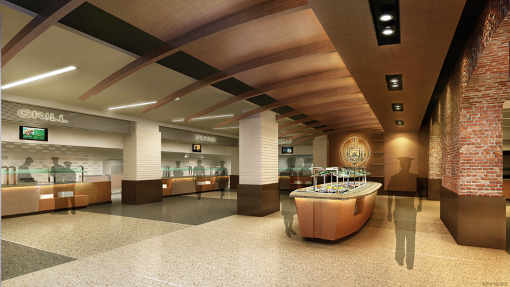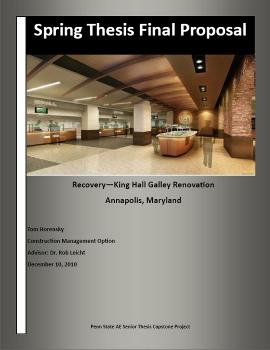|
United States Naval Academy
Recovery—King Hall Galley Renovation Annapolis, Maryland
Tom Horensky Construction Option |


|
Senior Thesis Home Page Pennsylvania State University Architectural Engineering Contact Me
This page was last updated on December 10, 2010. This website is hosted by the AE Department © 2010/2011. |
|
Thesis Proposal |
|
Breadth Requirements Mechanical Breadth The research proposals contained in Technical Analysis 1 and 2 both focus heavily on the mechanical portions of the King Hall Galley renovation, even though the techniques were developed with constructability, value engineering, and schedule reduction in mind. Conducting a comprehensive investigation of MEP schedule acceleration and alternate mechanical and plumbing delivery methods will require a deeper understanding of the mechanical side of the construction industry. In order to successfully carry out an overtime scenario, it will be necessary to research MEP industry working standards and wage rates for MEP contractors. For the alternate delivery method topic to be fully developed, it will be necessary to investigate cutting edge design methods for reducing field labor. In order to optimize the prefabrication proposal it will require background knowledge of the MEP fabricators, installers, and of the systems themselves. Additionally, expediting the coordination process will require an investigation into the capabilities of MEP modeling software. Compiling these research ideas into an overall improvement for the King Hall Galley renovation creates a tremendous opportunity for mechanical breadth research. Finally, by performing load calculations, knowledge of AE 310 will be displayed.
Structural Breadth Technical Analysis 3 will require substantial structural calculations as well as close coordination with the project’s structural engineer. The shoring required to support the building loads during the demolition of the masonry columns will be the first portion of the structural calculations and research. Engineering the best possible replacement columns, whether steel or concrete, will also require a substantial amount of structural calculations as well as an investigation into local construction methods and material costs.
Critical Industry Issues Breadth Technical Analysis 3 will incorporate research in the areas of prefabrication, integrated delivery methods, and building information modeling, all three of which were issues outlined in the critical industry issues section of the PACE Seminar.
MAE Requirements Technical Analysis 1 and 2 both incorporate coursework from AE 572 – Project Development and Delivery Planning. The related coursework deals with optimizing the efficiency of project delivery which both analyses incorporate through schedule acceleration scenarios. Additionally, Technical Analysis 2 incorporates material from AE 572 in the form of alternate delivery methods. The courses AE 598C – Sustainable Construction Project Management and 597G – Building Information Modeling Execution Planning both influence the research in Technical Analysis 2. In AE 598C lean and integrated construction methods are taught. This knowledge will be utilized in the prefabrication scenario along with the integrated delivery method that will be proposed. BIM Execution Planning will be utilized in the coordination efforts discussed in Technical Analysis 2. In order to successfully prefabricate the mechanical systems, it will be necessary to expedite the coordination process, which requires a focused BIM effort very early in the project. To ensure the coordination is completed in a timely manner, a BIM Execution Plan will be necessary. Additionally, the potential for digital fabrication will be explored. This will also require knowledge gained from the AE 597G curriculum. |

|
The Final Proposal is intended to summarize the intentions for the Thesis Investigation that will be occurring throughout the Spring 2011 semester. Each of the three proposals contained in this report is first presented in the form of a problem. Based on the problem or opportunity for improvement, a set of goals is laid out describing how the research topics hope to improve the Recovery – King Hall Galley Renovation project. The three technical proposals include MEP schedule acceleration, integrated design/assist MEP subcontracts, and redesign of the interior masonry columns. A detailed set of research methodologies are then provided followed by the resources that will be utilized to conduct the research. Finally, the expected outcomes are presented, including cost, schedule, and constructability implications. These analyses are expected to develop during the research process with the input of the Penn State AE advisors. |
|
Please click on the thumbnail below to view a PDF of the Spring Thesis Final Proposal |
|
Technical Analysis Methods Technical Analysis 1: MEP Schedule Acceleration MEP installation is a critical portion of the King Hall Galley project. It is so important that it lies on the project schedule’s critical path. There is a tremendous opportunity that exists with the MEP coordination and installation for a schedule acceleration utilizing some very traditional techniques as well as some recent innovative research in construction methods. This analysis will combine the different efforts to produce an MEP delivery that is ahead of schedule. Initially, the potential for overtime will be researched and this will be used to determine how much extra work can be performed during a typical week. Additionally, an investigation into the diminishing returns of working excessive amounts of overtime will be conducted to determine the maximum hours that employees should be working.
Technical Analysis 2: Integrated Design/Assist MEP Subcontracts Integrated delivery systems are a critical industry issue and one that will be researched relative to the King Hall Galley renovation to determine if the lifecycle of the project’s MEP work can be expedited. The goal of this research topic will be to investigate if bringing the mechanical and plumbing contractors into the design phase of the project could have reduced coordination time and therefore allowed for prefabrication and an overall more constructible design. The implications of prefabricated MEP systems will require substantial exploration to determine if prefabrication is feasible for a renovation project with the intriguing circumstances that King Hall possesses. With the added input from a contractor earlier in the design process, it is also a goal to determine if overdesign could be prevented, therefore providing a value engineering service. Load calculations will be utilized to determine if the MEP systems could be reduced.
Technical Analysis 3: Resign of the Interior Masonry Columns The existing galley contains interior load bearing brick columns of a very substantial size. Due to the age of these columns, a significant amount of repair is necessary to bring them back to a sufficient structural integrity and aesthetically pleasing nature. Rather than pursue the very inefficient process of locating all of the structural defects, research will be conducted to determine the feasibility of re-shoring and demolishing the columns in order to replace them with steel or cast-in-place concrete columns. The driving factor in this investigation will be a constructability review along with a presentation of the schedule and cost implications of changing the design. |

|
Reposted Thesis Proposal |